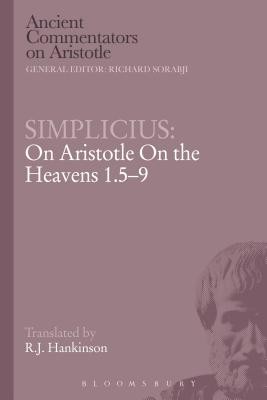
- We will send in 10–14 business days.
- Author: Simplicius
- Publisher: Bloomsbury Publishing PLC
- Year: 2014
- Pages: 192
- ISBN-10: 1472557425
- ISBN-13: 9781472557421
- Format: 15.6 x 23.4 x 1 cm, softcover
- Language: English
- SAVE -10% with code: EXTRA
Reviews
Description
Aristotle argues in On the Heavens 1.5-7 that there can be no infinitely large body, and in 1.8-9 that there cannot be more than one physical world. As a corollary in 1.9, he infers that there is no place, vacuum or time beyond the outermost stars. As one argument in favour of a single world, he argues that his four elements: earth, air, fire and water, have only one natural destination apiece. Moreover they accelerate as they approach it and acceleration cannot be unlimited. However, the Neoplatonist Simplicius, who wrote the commentary in the sixth century AD (here translated into English), tells us that this whole world view was to be rejected by Strato, the third head of Aristotle's school. At the same time, he tells us the different theories of acceleration in Greek philosophy.
EXTRA 10 % discount with code: EXTRA
The promotion ends in 17d.17:49:13
The discount code is valid when purchasing from 10 €. Discounts do not stack.
- Author: Simplicius
- Publisher: Bloomsbury Publishing PLC
- Year: 2014
- Pages: 192
- ISBN-10: 1472557425
- ISBN-13: 9781472557421
- Format: 15.6 x 23.4 x 1 cm, softcover
- Language: English English
Aristotle argues in On the Heavens 1.5-7 that there can be no infinitely large body, and in 1.8-9 that there cannot be more than one physical world. As a corollary in 1.9, he infers that there is no place, vacuum or time beyond the outermost stars. As one argument in favour of a single world, he argues that his four elements: earth, air, fire and water, have only one natural destination apiece. Moreover they accelerate as they approach it and acceleration cannot be unlimited. However, the Neoplatonist Simplicius, who wrote the commentary in the sixth century AD (here translated into English), tells us that this whole world view was to be rejected by Strato, the third head of Aristotle's school. At the same time, he tells us the different theories of acceleration in Greek philosophy.


Reviews